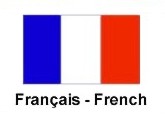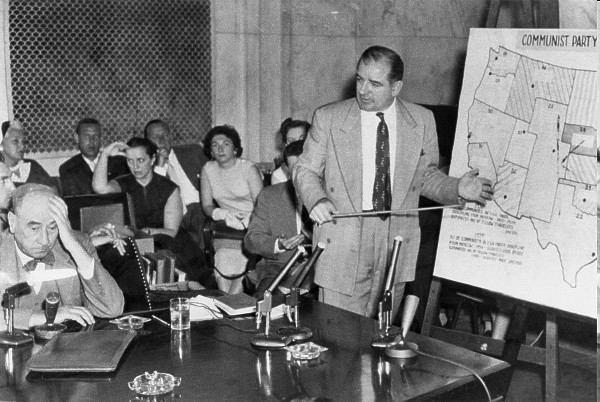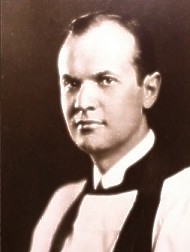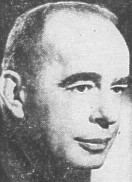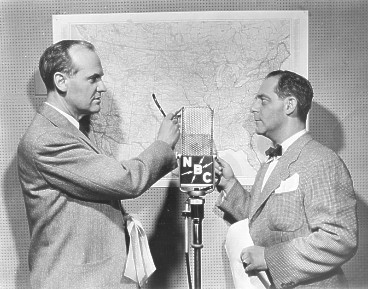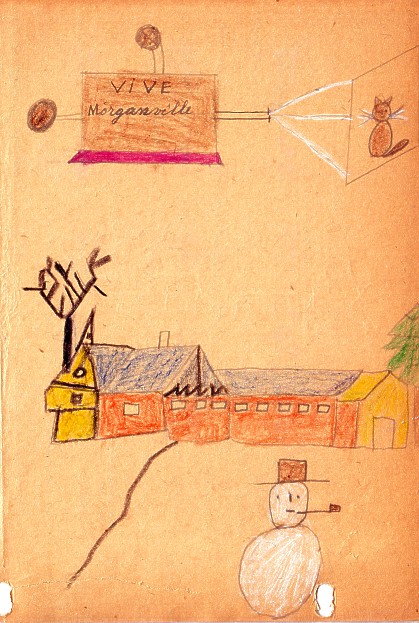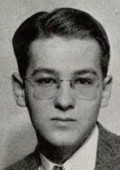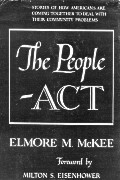Senator Joseph McCarthy interrogates Army representative Joseph Welch. It was a time when people lost their jobs only because someone accused them of being a communist.
But there were more than political matters loosening the strings that tied Morganville and Fèves together. A whole host of very
practical reasons contributed. From the start, the language barrier meant communication was slow and cumbersome. It also led
to a connection that was not so much person-to-person, as committee-to-committee.
Another problem was the state of Operation Democracy. It had been formed on the enthusiasm of the people living in Locust
Valley, New York. It was established as an altruistic venture by people such as former Congresswoman Isabella Greenway King,
who could well afford the cost. So no provisions were made for soliciting funds from donors or taking commissions for the
substantial services O.D. provided.
Todd was entirely in agreement with this course. In an August 22, 1949 letter to Carson, he commented, "I, for one,
couldn't face the thought that any part of Homer Christianson's [sic] $15.00 went to pay salary, overheads, etc., for an
organization that just gave some friendly advice."
With donors successfully encouraged to give exclusively to those in need overseas, Operation Democracy began to have
problems paying its bills. In that same letter, Todd wrote, "We cannot continue it beyond the Fall tied solely to
Mrs. King's pocketbook, and it would be dishonest to create the impression that we could."
Todd added he was hoping a foundation would step in and help. But in an April 14, 1950 letter to Roenigk in response to
Morganville's March 21 donation of $50, Todd mentioned he no longer had a secretary and then added:
Needless to say, however, Operation Democracy was deeply moved and very grateful for Morganville's generosity and faith in this program. As you know, we are continuing to operate on a shoe-string, and your help means far more than you can imagine to all of us.
But just as a fading fire often flares briefly, the sister cities were about to experience a new, albeit brief, period of additional national and international attention. Carson received a call from New York City which she mentioned in a March 21, 1950 letter to her daughter Cynthia:
On Friday, a fella is coming from New York from N.B.C. [National Broadcasting Company] to see about including Morganville in a series they are doing on "Democracy at work." Half-hour programs on the evening schedule. He, a Mr. McKee, phoned Sunday. Will be here a day or two.
Elmore McKee was a 1919 graduate of Yale University and also its first chaplain. He enjoyed international prominence
because of his position at Yale and later at large churches in Connecticut and New York.
After World War II, McKee became concerned that Americans were losing sight of what he considered an essential
aspect of democracy. He believed people were abdicating their responsibility to act individually and locally in
favor of having their government or some large organization address social problems. He proposed creating 13 half-hour
radio programs containing examples of one or a few Americans identifying a problem and taking action to address
it without relying on the government or some other distant agency.
Elmore McNeill McKee
McKee felt Operation Democracy was a perfect example of people taking action on their own, and so he had contacted Todd.
Asked for a good example to use in one of his programs, Todd recommended McKee contact Carson. The March 24 trip to
Morganville allowed McKee to meet Carson and some of the others who had been instrumental in creating the pageant and
organizing the efforts on Fèves' behalf. The plan was to return in the fall with a tape recorder and a script writer.
On April 10, Dan Roenigk wrote to McKee with some more good news.
We have just received the complete record of the program put on by Feves for us and it is in the form of [a] tape recording. lf you decide to use the Morganville-Feves setup and can use this tape record for the Feves angle of your program, we will be more than glad to loan it to you. It is in two rolls. We do not have a tape recorder, so until we can find one, I do not know what the program consists of.
In an April 14 letter to Roenigk, Todd thanked Morganville for making a donation to Operation Democracy and to the cost of converting the discs of the Fèves recording to tape. He ended with the following:
I have heard from Elmore McKee about the exciting time he had in Morganville, and he assures me that the network series
he is working on will include the Morganville story. I hope Morganville will survive the numerous New Yorkers who continue
to drop in on you. If Morganville were just a little closer to us, I'm sure you'd have a lot more of us to deal with.
Please give my regards to Velma Carson when you see her, and I hope you will express my personal thanks to everyone in
Morganville for the splendid help you have given us.
A June 28, 1950 letter to Carson from McKee confirmed Todd's news that Morganville would once again make a splash on the national scene and gave a few additional details:
I am glad to be able to report that the Fund Trustees have approved the thirteen specific projects and NBC has
committed themselves to weekend radio time - probably after the football season.
Before long, I shall be writing you as to when it will be convenient for the script writer and myself to pay Morganville
a visit. Possibly this would come best in the early autumn rather than later.
But before McKee's return, Morganville had a mid-summer visit from the Utleys, who had recently returned from their long
overseas posting. People were eager to hear about their visits to the small French village. A program was held on July 14
in the Morganville schoolhouse. In addition to viewing the Utley slides, Roenigk formally presented the Fèves woodcarving
to the villagers. The tape recording from the June 23, 1949 program in Fèves was also played.
The Morganville paper mentioned in an article before the program that "some of the girls who studied French this winter are
going to try to sing" the French song "Sur le Pont d'Avignon," which was performed by the Fèves schoolchildren for Todd
during his visit to the village and during the program recorded in June 1949.
A later article stated the Utleys said the Jacobson painting was hung in a classroom in the Fèves schoolhouse.
Roenigk said the Fèves carving would be placed in the Morganville school.
McKee and script writer Lou Hazam arrived in Manhattan, Kansas in the afternoon of Monday, September 18, just a bit more
than two years after the pageant. Hazam was early in his career and would go on to earn many awards, primarily for his
work in television documentaries.
After supper in the Briggs Hotel, Carson drove them to Morganville. For the next two days, McKee recorded interviews
with community members, who described their selection of their sister city, the pageant and the collection and shipment
of materials to France.
Lou Hazam, script writer
The first half-hour program was broadcast at 6 p.m. on Saturday, December 9, 1950, over the NBC radio network to
audiences in the United States. The Armed Forces Radio Service carried the program to U.S. troops. The series was
called "The People Act."
For the next 12 weeks in the same time slot, a new episode was aired.
The December 14 issue of the Tribune announced details of Morganville's story.
Elmore McKee, left, and program host Ben Grauer
Listen to Morganville Broadcast on the Air
Morganville's part in the National Broadcasting Company series called "The People Act" has been scheduled for Saturday
evening, December 23, at 7 to 7:30 Eastern Standard time. This will be 6 to 6:30 our time. The nearest NBC station for us
is probably WDAF at Kansas City.
This is the program which Elmore McKee and Lou Hazam of Washington, D.C. were working on last fall when they were here
making tape recordings. Both Morganville and Feves voices will be heard over the national coast to coast network.
The Morganville program was called "A Prairie Noel." Many of the village's expatriots wrote to the newspaper and others in
the village about their surprise at hearing the story their hometown had played such a key role in.
McKee wrote a letter to Roenigk the day after Christmas, which read in part:
I thought a great deal about my friends in Morganville over the Christmas season, and my wife and I listened with breathless interest to the program which had been recorded in advance. On the whole, the public response has been very encouraging. We are deeply grateful to all of you for having given us such a magnificent Christmas story. It was wonderfully authentic. ... I feel that we all must rejoice in the net effect of the program in this moment of world history.
The Noel Ball was held on December 29, 1950, three days after McKee wrote his letter. But the money raised that year was not used to purchase food or clothing. Fèves was no longer in need of such things. Instead, the money was used to buy a projector. An article in a nearby paper quoted Carson:
"Our gift this year is to the school - a projector for colored slides," Mrs. Carson said. "We have sent them slides of our selves, and some we have of them, but they can't see them very well because they don't have a projector. We are also sending Christmas cards."
Some misunderstanding apparently had taken place as Father Holveck had a 35-mm-slide projector. The school also had access to $25. So when Morganville's $100 arrived, the older students went about the village and collected $20 additional. With the resulting $145, the school was able to purchase a motion-picture projector.
Torlotting apparently coached his students what to write in the thank-you letters as they were all similar. Each was accompanied by a unique drawing, although every one included a projector.
Fèves
3rd of January, 1951
Dear friends;
I am writing a little letter to thank you for your check for $100.00 which is 35,000 francs. We have collected in
the village $20.00 and we have in a cooperative fund $25.00, altogether we have $145.00. With all of this we can
buy a splendid machine. Think of this for a small village like Fèves. We will be able to know your town better.
During the Christmas holidays we had much snow.
For the new year, I wish you, my friends in Morganville, a good and happy new year.
Your little friend,
Jeannine Baudouin, 11 years old
Above: Thank-you letter to Morganville from Fèves student Jeannine Baudouin; right: 10-year-old Jeanne Gilles' thank-you letter drawing.
But the separation growing between the two villages can be heard in another Carson statement in the same article: "Now we
are on a more polite basis. We are friends and we try to write letters, but it is hard because of the languages."
The on-going financial problems at Operation Democracy led to Todd taking an international relations job with the federal
government late in 1950.
And it wasn't just Operation Democracy that was experiencing financial difficulties. An October 6, 1950 letter from Roenigk
to Contract Packers in New York, included the following:
The past two years we have been shipping our gift shipments of food, clothing, etc. to our adopted town of Feves, France through the American Aid to France, Inc.[,] but since they have quit operations, I was wondering whether our town could enlist the help of your committee in handling our shipments in the future.
Morganville also lost Henry Millikan, the minister who had prodded Carson and the others in the village to get involved.
Never one to stay in a post very long, he left after just one year. He was replaced by exceptionally capable, but
fresh-from-school Joseph Buckles.
Changes came to Fèves as well. Late in 1951, Fèves mayor Berne died. About the same time, Father Holveck left to become
the priest several miles to the south in Noveant-sur-Moselle.
Joe Buckles
While Carson remained as the head of the committee in Morganville, the problems she had with her eyesight and other concerns meant the Morganville connection was largely maintained by Roenigk. In Fèves, only committee member Torlotting remained. So in mid-December of 1952, Roenigk arranged with CARE to send English lessons and a woolen blanket to the Torlottings.
McKee returned to Morganville in 1954 to update the story for chapter 7 of his book to be published the
following year. Elements of the connection forged six years earlier remained.
McKee's 1955 book
Roenigk told him,"The new school principal is much interested, and the children are exchanging letters with Fèves,
and we are trying to find a way to bring the Torlottings to Kansas."
McKee wrote, "... the fund is growing and August Kolling stands ready to meet the visitors in New York and drive
them west."
Carson indicated she hoped they might be able to come by the Noel Ball in 1955.
Still, there was an awareness things had changed. The airline tickets were never purchased. The latest artifact of
the sister city relationship from the 1950s in the files of the Clay County Historical Society museum is a January 14,
1954 item from the Morganville Tribune. And so, for the most part, all that remained were the fading memories of
people preoccupied with the demands of daily life.
Perhaps the situation is best described by Carson's own words: "There lingers here the afterglow of a splendid dream."
This January 14, 1954 Morganville Tribune item is the latest artifact from the 1950s in the Clay County Historical Society museum files related to the sister cities.
To Morganville School Children
Feves, France, December 11, 1953
Dear Friends:
I am writing you a few lines to inform you of some of the facts which have happened in our village during the year
1953. At Feves, Mr. Pierson's farm has been completed and Mrs. VeBerne's barn is under construction.
The strawberry crop has been very good this year, but the fruit crop in general was lamentable. I wish to thank you
for your gifts which enabled us to visit the Han Grotto in Belgium. With the photos which Mr. Kolling
sent us, it was possible for us to see the Colorado scenes and views of Morganville as well as views concerning cotton
culture. Thanks for these views which have enabled us to know America better.
During vacation, Mr. Schoolmaster received Mr. Johnson and with his vehicle (car) was able to show him Verdun and
also the American Cemetery at Thiaucourt.
Not very far from our town on the plateau near St. Privat there is an American base where the soldiers held
maneuvers. There is also a new scale for the distillery, so now as many liters as you make is what you pay for.
For the time being, the weather is nice enough. It was even 21 degrees in the sunshine. Towards morning, there is
always a little haziness or fog.
Dear Friends of Morganville, I am signing off in wishing you a joyful Christmas and may the New Year of 1954
procure for us many joys.
Your friend,
Jeanne Gilles

